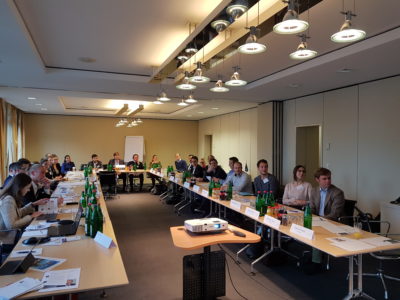
In Europe, populist movements are attracting a growing number of voters with messages that are simplistic and nationalist. These parties do not offer sustainable solutions; instead, they stir up resentment against political institutions – including the European Union – and people with different backgrounds and beliefs. This endangers the understanding among nations.
United Europe focussed its 11th Young Professionals Seminar from October 6-8, 2017, on ”The Populist Challenge.” The participants, 25 young professionals from twelve European nations, spent an intensive two days in Hamburg debating the many facets of this topic.
In their conclusions, they focused on four areas: the nature of populism; the real issues underlying people’s dissatisfaction with the political system; proposals to improve the democratic system; and ways to make the EU more responsive.
1. How to spot populists:
Populism is very different from one country to the other, and from the right-wing to the left-wing, but there are common traits and techniques. It is important to take note of these – and to educate people about them – in order to strengthen awareness of the risks involved.
- Methods: Populists aim on creating an “us against them”, relying on short messages, simplistic solutions and a harsh polemic against the elites.
- Leaders: Populists tend to put emotions first and celebrate the breaking of taboos. In populist parties, you often have a cult of personality around narcissistic leaders.
Populists claim that they represent the common will (Jean-Jacques Rousseau’s volonté générale), but in many cases, they misrepresent the meaning of the greater good. Populism is dangerous for Europe and for peace. Separatists employ populist methods to gather supporters around nationalist programmes. The success of populist parties is also tempting centrist leaders to adopt populist rhetoric.
2. Recognize real issues and do something about them:
Populist movements feed on real causes and fears:
- Rising income inequality; the middle classes shrink
- Tax competition between countries erodes the public finances
- Digitalisation and automation: robots won’t just replace factory workers but also millions of white-collar jobs, threatening the livelihoods of well-educated, well-paid people. There will be new jobs, but probably not as many as get lost
- Fear of losing status, identity and values
- Fear of immigration increasing competition for jobs, housing and benefits
- Fear of terrorism
What can be done:
- Digitalisation is not happening overnight, so we have some time to find solutions
- Short term solutions can include instruments like imposing taxes on robots or giving people an unconditional basic income
- In the longer term, profound cultural change is needed to encourage people to engage in life-long learning. “Restart at 50”
- Improve the pay and the image of working in education and health where millions of jobs are open
- Provide equal opportunities for everybody in the society: strengthen the public school system and universal health care; harmonise the tax system
- Provide affordable housing and childcare
- Provide better security
3. Improve the democratic process
Populist movements stir up resentment against elites, institutions and the political decision-making process. This can only be counteracted by engaging people more actively, especially the young. Don’t be a fool, voting is cool!
- Enable people to vote: chose elections dates carefully; make it easy to register and vote; consider electronic voting
- Improve political education for children throughout school, consider lowering the voting age, introduce gamification of the voting process
- Explore research into the effectiveness of door-to-door campaigning
- Communicate effectively; keep your message simple
- Be careful about using referenda
4. Protect the European project
The European Union is particularly vulnerable to populist movements. A majority of Europeans continues to be in favour of European integration. Yet serious reform is needed if we want to safeguard the European dream.
- Regulate lobbyism
- Analyse costs of EU institutions and benchmark them against other democratic systems
- Reduce redundancy between Brussels, Luxembourg and Strasbourg
- Reduce, as far as possible, the complexity, and increase the transparency of EU decisions
- Review agricultural subsidies and other policies that are both expensive and create resentment
- Improve communications and dialogue with the public


